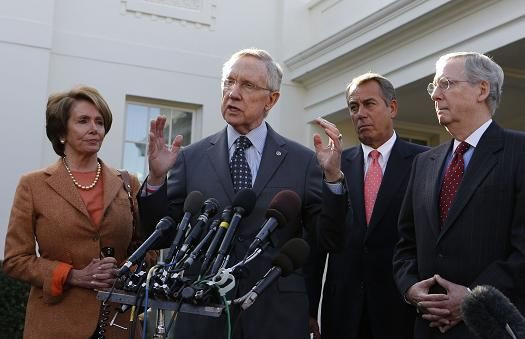Americans Expect Congress To Act Like 'Spoiled Children' During Fiscal Cliff Talks

The American public views the looming “fiscal cliff” as a serious crisis, according to a new poll, which also found the nation is far more likely to blame congressional Republicans than President Barack Obama if lawmakers fail to reach a deal before the end of the year.
Forty-five percent of respondents in a new CNN/ORC poll said they would blame Republicans if Congress fails to reach an agreement to ward off the series of tax cuts set to expire in January, compared to 34 percent who said they would point their finger at Obama.
The “fiscal cliff” refers to the $500 billion worth of tax increases and spending cuts that will begin in January unless Congress can reach a compromise within the next few weeks. If it doesn’t, then the Bush tax cuts, as well as the payroll tax cut, will automatically expire next year -- meaning taxes will rise for most Americans.
While more than 70 percent of respondents said a compromise is necessary to resolve this issue, they don’t actually expect that to happen. In fact, two-thirds also predicted Washington lawmakers will act like “spoiled children” and not “responsible adults” in the upcoming budget negotiations.
As of now, Democrats and Republicans continue to disagree about how to raise government revenue to avoid those automatic tax increases and spending cuts. While the president and most congressional Democrats advocate tax increases on the wealthiest Americans to raise revenue, Republicans have called for reforming the tax code – for instance, by closing loopholes – but have not said they would raise taxes.
According to the poll, about a quarter of respondents said going over the fiscal cliff would cause major problems. But while another quarter said only minor problems would occur, an overwhelming 77 percent told CNN they believe their personal financial situation could be affected if lawmakers fail to reach an agreement.
The White House warned in a new report Monday that going over the so-called “cliff” could limit consumer spending during the holiday season and slow the growth of real gross domestic product by 1.4 percent, the Wall Street Journal reports.
A November report from the nonpartisan Congressional Budget Office said the potential tax increases and spending cuts could drive the U.S. economy back into a recession in 2013.
© Copyright IBTimes 2024. All rights reserved.





















